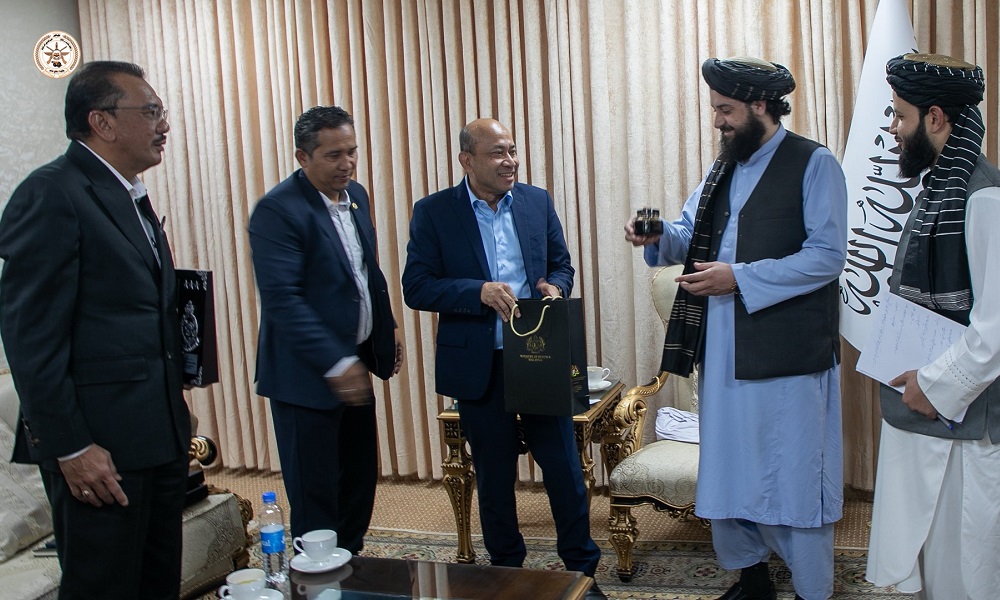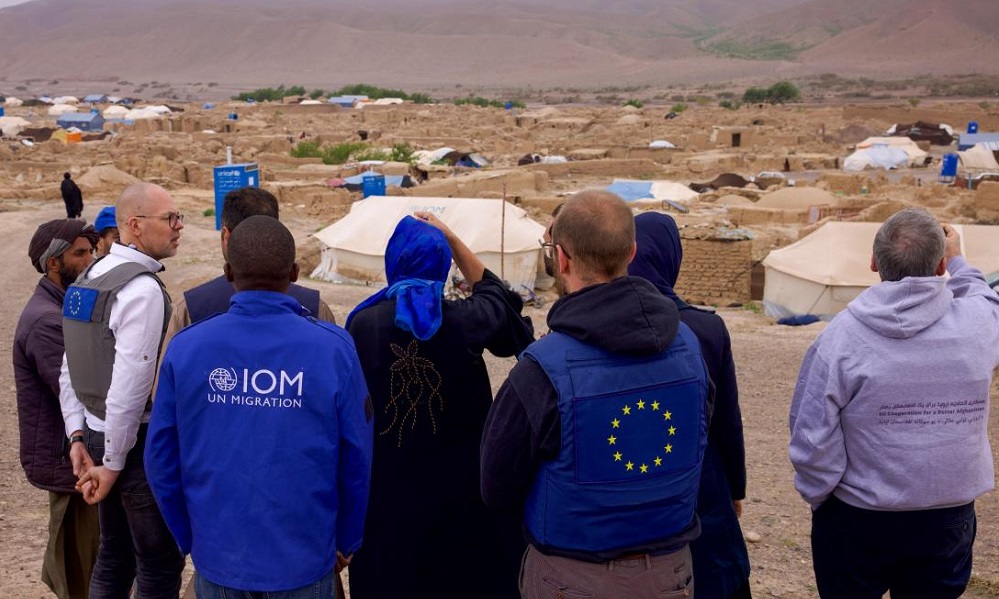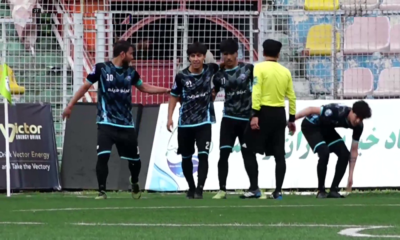Latest News
Afghanistan’s 4 million IDPs need urgent support amid pandemic

Amnesty International has called on the Afghan government and the international community to step up assistance to Internally Displaced People (IDPs) and provide urgent access to adequate housing, food, water, sanitation, and health.
“The Afghan government and the international community must urgently scale up efforts to support the country’s four million internally displaced people (IDPs), who have been left badly exposed throughout the COVID-19 pandemic,” said Amnesty International in a new briefing published on Tuesday.
The briefing, “We survived the virus, but may not survive the hunger” looks at the impact of COVID-19 on Afghanistan’s internally displaced,and details how the pandemic has made an already dire situation for IDPs even more precarious.
Living in overcrowded conditions, with insufficient access to water, sanitation, and health facilities, IDPs have little or no means of protecting themselves from contracting, spreading, and recovering from COVID-19, Amnesty International said.
The briefing also addressed the dire conditions in camps and the inadequacy of aid efforts targeted at IDPs.
Camps are cramped, unsanitary and lack even the most basic medical facilities.
According to Samira Hamidi, Amnesty International’s Deputy Regional Director for South Asia, “Afghanistan’s four million displaced people live in conditions perfectly suited to the rapid transmission of a virus like COVID-19.
“The camps are cramped, unsanitary and lack even the most basic medical facilities. Despite this deadly combination, IDPs have been provided with precious little support to mitigate their situation,” said Hamidi.
“With the number of IDPs increasing daily due to ongoing conflict and the danger of a further wave of COVID infections still present, the Afghan government and international community must do more to protect IDPs.”
“Amnesty International is calling on the Afghan government and the international community to abide by their obligations to IDPs under international law, and allocate specific funding and resources targeted at IDPs to meet their urgent need to access adequate housing, food, water, sanitation, and health,” Amnesty International stated.
Amnesty International spoke to IDPs in settlements in Kabul, Herat and Nangarhar, and found in most cases basic services such as access to water and sanitation have not been provided, and with cramped living spaces, social distancing is not possible, leaving IDPs unable to maintain the hygiene required to prevent the spread of the coronavirus.
Amnesty International also found that IDPs have not been provided with access to adequate medical facilities in the camps.
A 45-year-old woman living in a camp in Nangarhar said: “Most families had the signs of coronavirus, but they were not able to do any test to find out whether they were affected or not. At least seven people who were believed to have contracted coronavirus died in the settlement but again we could not verify due to lack of tests and access to health facilities”.
According to the IDPs interviewed by Amnesty International, there has not been any targeted assistance to women or children by government agencies or international humanitarian organizations during the lockdown.
An IDP in Nangarhar said: “We are living with nothing honestly, we don’t have work, we don’t have money and we don’t have anywhere to live. All I want from the Afghan government and the international community is to help us return to our own villages, help us to rebuild our lives, and live in dignity.”
“COVID-19 clearly presented an enormous challenge to the Afghan government. Though unintended, measures aimed at tackling the pandemic have had a disproportionately damaging impact on IDPs – the country’s most vulnerable group. Dedicated resources and greater support from the international community must be forthcoming to mitigate that impact to the furthest extent possible,” said Hamidi.
Escalating conflict in Afghanistan over the past year has resulted in a rise in the numbers being displaced, with thousands of new cases being registered each week.
According to the UN Office for the Coordination of Humanitarian Affairs, around 327,000 people were displaced in 2020, 80 percent of whom were women and children.
The Afghanistan Humanitarian Response Plan, which envisioned much improved living conditions for Afghans by 2021, remains severely under-funded, with only 23 percent of requirements having been funded as of 24 July 2020.
Latest News
Tripartite trade meeting held in Kabul to boost regional connectivity

A tripartite meeting between the delegations of Afghanistan, Turkmenistan and Kazakhstan was held in Kabul with the aim of connecting North Asia to South Asia and reducing transit and transportation costs among these three countries, the Ministry of Trade and Commerce said in a statement.
In this meeting, an agreement was reached on the creation of a joint technical committee to continue the talks.
This tripartite meeting was held under the leadership of Nooruddin Azizi, the Acting Minister of Industry and Commerce, Vice President of Turkmenistan and Srik Zhumangarin, the Deputy Prime Minister of Kazakhstan.
Earlier, a bilateral meeting was held between the delegation of the Islamic Emirate and Turkmenistan. The ministry of commerce said the participants of the meeting discussed the construction of a large joint logistics center in Torghondi, the trilateral transit agreement between the IEA, Turkmenistan, and Kazakhstan, the expansion of Afghanistan’s railway, solving issues related to Afghan transit and export goods, and a number of other commercial issues.
Latest News
No destructive groups including Daesh present in Afghanistan: Yaqub Mujahid

Acting Minister of National Defense Mohammad Yaqub Mujahid has said that no destructive groups including Daesh have physical presence in Afghanistan, adding the Islamic Emirate of Afghanistan (IEA) will not allow anyone to pose threat to any country in the region from the Afghan soil.
Mujahid made the remarks in a meeting with a delegation from Malaysia in Kabul on Thursday.
According to a statement released by the Ministry of Defense, Mujahid highlighted Malaysia’s “good treatment” of Afghan refugees and its long-standing relations with Afghanistan, and said that Malaysia is a powerful Islamic country and visits should increase.
He added that with the establishment of the Islamic Emirate, occupation and war ended in Afghanistan, and the country is fully secure.
Based on the statement, the Malaysian delegation called Afghanistan a friendly country and while emphasizing on comprehensive cooperation, it assured that what they have seen in Afghanistan will be shared with the authorities of their country.
Latest News
EU allocates 17 million euros to support Afghans on the move

The European Union signed an agreement worth 17 million euros with the International Organization for Migration (IOM) to improve access to basic services, increased economic opportunities and protection for Afghans on the move and their host communities in Afghanistan.
The needs of women and girls are a particular focus of the programme, EU said in a statement released on Thursday.
The statement noted that from January 2023 until April 2024, over 1.5 million Afghans returned from Pakistan and Iran.
“I am deeply moved by the hardship returnees face when being deported to Afghanistan. In a country suffering from poverty and climate change, and in a city that just saw devastating earthquakes, this truly is a crisis within a crisis.”, said Peteris Ustubs, Director for the Middle East, Asia and Pacific of the European Commission’s Department for International Partnerships during the signing ceremony at the IOM transit centre in Herat.
Raffaella Iodice, EU Chargée d’Affaires a.i. to Afghanistan, added “The solidarity of the Afghan people towards their brothers and sisters is an inspiration. We must assure that communities hosting and helping new arrivals are supported. The partnership with IOM ensures access to essential services and provides protection for Afghan returnees and their host communities. As women and girls can be particularly affected, we make sure that all members of society can benefit”.
“IOM’s continued partnership with the EU has been critical in enabling our teams to reach hundreds of thousands of Afghan returnees and other vulnerable communities in the country”, said IOM Afghanistan Chief of Mission, Maria Moita. “Thanks to this renewed commitment, we will be able to focus on addressing the immense challenges in the areas of return and contribute to reintegration, social cohesion, and longer-term solutions for those communities.”
This additional contribution is part of a 5-year programme that is being implemented across Afghanistan and in four countries in the region. It builds on the EU’s previous support to IOM to improve the wellbeing of Afghans forced to return to the country, EU said.
-

 Latest News4 days ago
Latest News4 days agoRashid Khan named AWCC’s brand ambassador
-

 Regional5 days ago
Regional5 days agoIranian president lands in Pakistan for three-day visit to mend ties
-

 Sport5 days ago
Sport5 days agoKolkata beat Bengaluru by one run in IPL as Kohli fumes at dismissal
-

 Sport5 days ago
Sport5 days agoACL: Aino Mina 3-0 Istiqlal Kabul; Attack Energy 3-0 Khadim
-

 Climate Change5 days ago
Climate Change5 days agoRescuers race to reach those trapped by floods in China’s Guangdong
-

 World4 days ago
World4 days agoMalaysian navy helicopters collide in mid-air, 10 killed
-

 Sport4 days ago
Sport4 days agoJaiswal ton powers Rajasthan to big IPL win
-

 Sport4 days ago
Sport4 days agoMawj Sahil player scores stunning halfway line goal in 1-0 win over Jawanan Wahedi
























